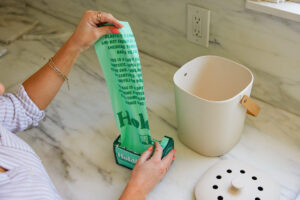You’re reading Relationships DIY, a series full of tips, tricks and perspective on keeping your relationship healthy and happy during the pandemic.
In school, we’re taught maths, science, languages and even the (absolute basics) of heterosexual sex – but we’re never really taught how to have a good relationship.
Most of us learn from those around us – our parents or family members. And, as we grow older and form our own romantic relationships, we then learn from our mistakes (of which there are many).ADVERTISING
Unsurprisingly then, when it comes to our relationships and sex lives, silence prevails. Six in ten UK adults in a relationship admit they don’t speak to anyone for relationship advice, according to a YouGov survey, commissioned by the Open University and new relationships app Paired.
Paired is born from a need for us to open up about our relationships – especially when so few of us get help from experts for issues relating to our love or sex lives. The same survey found just 1% of people would seek couples therapy or counselling for problems within their relationship and only 5% would get professional help for problems with their sex life.
On the app, partners ‘pair’ with each other on their individual phones and answer daily questions and quizzes to learn more about each other. You can also listen to tips on how to build healthy relationship habits from experts.
But is an app the solution to this void of information that so many of us have in our lives? Three HuffPost UK staffers put it to the test for a week.
‘Some of the topics that came up were things we’d never discussed before’
Angela and Tom have been together for 11 years and live together.

Once paired with your partner, the app itself is pretty straightforward to use (which means a lot coming from a technophobe grandma like myself).
There are daily tips from the therapists, which are great conversation starters to prompt couples to talk about important issues that matter in relationships such as commitment, conflict, money, intimacy and more.
Some of the topics that came up were things Tom and I had never discussed before, which made us see each other in a different light. Although, it was pretty revealing when we’d come up with different answers – like when he said he didn’t want to be my colleague because he thought I worked chaotically and he liked things in a certain way (uh, rude!).
My only issue is that some of the advice offered was a little corporate and cookie cutter-esque, where one piece of advice doesn’t fit all. I feel Tom and I are pretty open in terms of talking things through, resolving conflict and being there for one another, so this app didn’t really change much, but I’d definitely recommend for other couples to try out and test one another.
‘The first night we used it, we had a huge row’
Ramzy and David have been together for 13 years, lived together for 10, and married for four years.

We’ve taken to calling Paired “the divorce app” – partly in jest – but also because on the first night we used it, we had a huge row about whether or not we respected each other that lasted into the next morning. Some of the things it brought out needed to be said so in that sense it was helpful, but it also dredged up a lot that we needed to work through at a time that might not have been ideal given everything else happening in our lives.
It delivered a few uncomfortable truths, but I can’t blame the app for that. All I would say is, don’t download it hoping for a bit of fun – do it as though you were going to a therapist, prepared to hear difficult things and to feel challenged.
The app itself is relatively easy to use, though it took a little while to work out where alerts lived and what we were meant to do. I’d have found it helpful if it prescribed us a diet of quizzes, tips, videos, rather than relying on us to navigate around and find them on our own.
I’m not sure I’d pay for it. The discussion points from therapists didn’t factor into the discussions we ended up having because they weren’t responsive to our specific problems – only to the basic ratings we’d given our happiness in different areas.
Most of our problems stem from capitalism – that is, how much time I spend at work, and our differing views within the very similar space on the political spectrum that we occupy. In that sense, I don’t think we learned much about each other, but maybe it was a reminder to listen more, and it did prompt us to recognise that we can treat each other as symbols of different ideologies to be criticised – rather than as people once we get going in an argument.
‘I realised we aren’t very good at taking things seriously’
Tasha and Dan have been together for almost six years and live together with their two cats.

I had doubts an app could teach me much about my relationship – so I was surprised when it sparked conversations that we’d never had before.
When we started answering questions in the Daily Conversations section, I realised we aren’t very good at taking things seriously – especially Dan. He answered: how can your partner best support you in your work? with, ‘by making lots of teas’ – then said our biggest strengths as a couple are ‘our cats’ (which, to be fair, did make me laugh a lot).
But when we got into the swing of it and took it a bit more seriously, it was insightful. The daily quizzes sparked conversations we wouldn’t normally have had around work/life balance (mainly mine being terrible), household responsibilities (the unequal distribution of chores), as well as how connected we’ve felt during the pandemic. You rank how happy you are in relation to various statements and it then prompts discussions, especially if there are discrepancies between the two of you.
There were parts that also reminded me of how great Dan is – one question asked what’s your favourite thing your partner ever did for you to mark a special occasion? It reminded me of the incredible effort he’s often gone to to make birthdays special. You can easily forget that stuff, or push it to the back of your mind, unless something prompts you to think about it.
We both found the app quite difficult to navigate. For example, when I’d answer a question, Dan couldn’t find where my answer lived if he didn’t immediately click on the notification. It took me a while to find this, too.
I had to force myself to listen to some of the therapist tips and workshops as part of the app – not because I didn’t want to, but because I was more drawn to the quizzes and questions, and the conversations that came out of them. If the tips were offered at the end of quizzes, perhaps I’d be more inclined to listen.
Some tips were great, though. One of them, from couple’s therapist Judith Lask, said we often stop saying “thank you” to our partners, when we would say it to our friends and family. I could definitely be better at saying “thank you” to Dan. “Grateful couples are more likely to stay together, feel closer, and show more commitment to their relationship,” said Judith.
There’s lots more to be discovered on the app – and for people feeling like there might be something missing in their relationship, or those who want to start tricky conversations, it could be a handy starting point.
The writers and their partners were given access to Paired Premium for this review. The service costs £49.99 for the year or £9.99 for one month.




